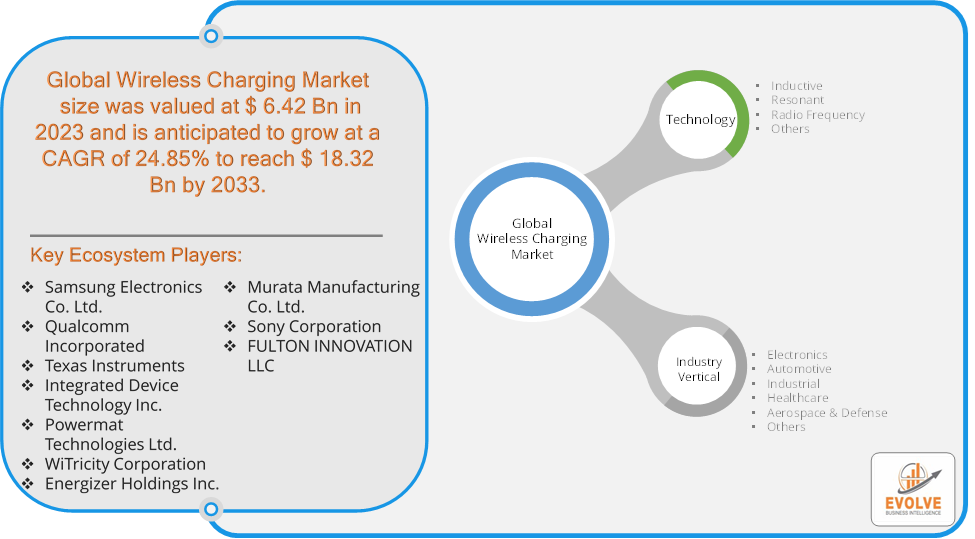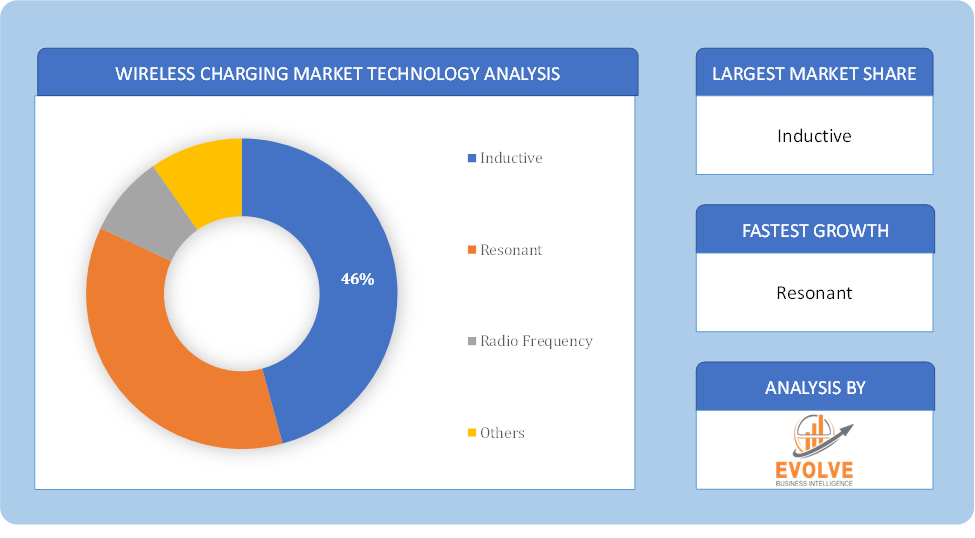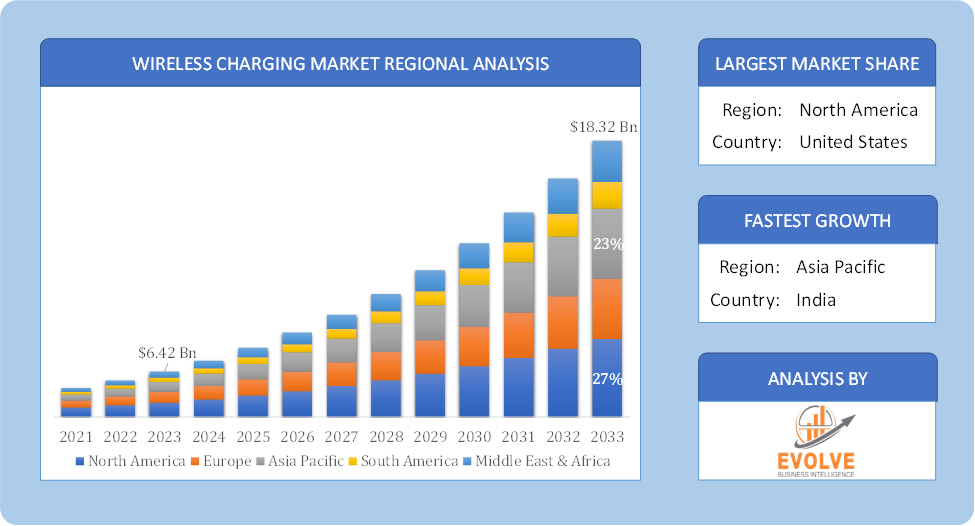Wireless Charging Market Analysis and Forecast 2023-2033
€ 1,230.43 – € 4,886.30Price range: € 1,230.43 through € 4,886.30
Wireless Charging Market Research Report: Information By Technology (Inductive, Resonant, Radio Frequency, Others,), By Industry Vertical (Electronics, Automotive, Industrial, Healthcare, Aerospace & Defense, Others), and by Region — Forecast till 2033
Page: 95
Wireless Charging Market Overview
The Wireless Charging Market Size is expected to reach USD 18.32 Billion by 2033. The Wireless Charging industry size accounted for USD 6.42 Billion in 2023 and is expected to expand at a compound annual growth rate (CAGR) of 24.85% from 2023 to 2033. The Wireless Charging Market refers to the technology and systems that enable the transfer of energy from a power source to a device without the need for physical connectors or cables. This is typically achieved through electromagnetic induction, resonant inductive coupling, or radio frequency-based charging. The market includes a wide range of applications, such as smartphones, electric vehicles, medical devices, and wearable technology. Growth in this market is driven by the increasing adoption of consumer electronics, the push for wireless infrastructure, and the development of more efficient and faster-charging solutions.
Global Wireless Charging Market Synopsis
The COVID-19 pandemic has led to supply chain disruptions leading to supply shortages or lower demand in the Wireless Charging market. The travel restrictions and social-distancing measures have resulted in a sharp drop in consumer and business spending and this pattern is to continue for some time. The end-user trend and preferences have changed due to the pandemic and have resulted in manufacturers, developers, and service providers to adopt various strategies to stabilize the company.
Wireless Charging Market Dynamics
The major factors that have impacted the growth of Wireless Charging are as follows:
Drivers:
Ø Advancements in Technology
Innovations in wireless charging technology, such as faster charging speeds, longer range, and improved efficiency, are making wireless charging more practical and appealing. The development of new standards, such as Qi and AirFuel, has also facilitated interoperability and widespread adoption.
Restraint:
- Efficiency and Power Loss
Wireless charging systems often suffer from lower energy transfer efficiency compared to traditional wired charging. Energy loss during transmission can result in slower charging times and increased power consumption, making wireless charging less attractive, particularly for high-energy devices like electric vehicles. This inefficiency remains a significant technical barrier that researchers and manufacturers need to overcome.
Opportunity:
⮚ Advancements in Long-Range Wireless Charging
There is significant potential for growth in the development of long-range wireless charging technology, which could allow devices to be charged from a distance without the need for physical contact with a charging pad. This would revolutionize the convenience of wireless charging, making it possible to charge devices while they are in use or moving within a certain range. Companies that pioneer long-range solutions could unlock new applications and dominate a rapidly evolving market segment.
Wireless Charging Segment Overview
Based on Technology, the market is segmented based on Inductive, Resonant, Radio Frequency, Others. the Inductive technology segment dominates, primarily due to its early adoption, reliability, and widespread use in consumer electronics, such as smartphones and wearables, supported by established standards like Qi.
By Industry Vertical
Based on Industry Verticals, the market has been divided into the Electronics, Automotive, Industrial, Healthcare, Aerospace & Defense, Others. the Electronics segment dominates, driven by the widespread adoption of wireless charging in consumer devices like smartphones, tablets, and wearables, which constitute the largest market share due to their high demand and frequent usage.
Global Wireless Charging Market Regional Analysis
Based on region, the global Wireless Charging market has been divided into North America, Europe, Asia-Pacific, the Middle East & Africa, and Latin America. North America is projected to dominate the use of the Wireless Charging market followed by the Asia-Pacific and Europe regions.
 Wireless Charging North America Market
Wireless Charging North America Market
North America holds a dominant position in the Wireless Charging Market. Due to a rise in smartphone usage, the North American wireless charging market will dominate this industry. Furthermore, the region’s market will expand at a faster rate due to the increasing sales of electric vehicles.
Wireless Charging Asia-Pacific Market
The Asia-Pacific region has indeed emerged as the fastest-growing market for the Wireless Charging industry. Because there are sufficient advanced electric car manufacturing facilities and contemporary research & development facilities in the Asia-Pacific region, the market for wireless charging is anticipated to grow at the quickest compound annual growth rate (CAGR) between 2024 and 2032. Additionally, the wireless charging market in China had the biggest market share, while the wireless charging market in India had the quickest rate of growth in the Asia-Pacific area.
Competitive Landscape
The global Wireless Charging market is highly competitive, with numerous players offering a wide range of software solutions. The competitive landscape is characterized by the presence of established companies, as well as emerging startups and niche players. To increase their market position and attract a wide consumer base, the businesses are employing various strategies, such as Technologylaunches, and strategic alliances.
Prominent Players:
- Samsung Electronics Co. Ltd.
- Qualcomm Incorporated
- Texas Instruments
- Integrated Device Technology Inc.
- Powermat Technologies Ltd.
- WiTricity Corporation
- Energizer Holdings Inc.
- Murata Manufacturing Co. Ltd.
- Sony Corporation
- FULTON INNOVATION LLC
Key Development
In September 2022, Samsung Electronics Co. Ltd. focused on enhancing its wireless charging technology, particularly by integrating more efficient and faster-charging capabilities into its new line of Galaxy smartphones and accessories, strengthening its position in the consumer electronics market.
Scope of the Report
Global Wireless Charging Market, by Technology
- Inductive
- Resonant
- Radio Frequency
- Others
Global Wireless Charging Market, by Industry Vertical
- Electronics
- Automotive
- Industrial
- Healthcare
- Aerospace & Defense
- Others
Global Wireless Charging Market, by Region
- North America
- US
- Canada
- Mexico
- Europe
- UK
- Germany
- France
- Italy
- Spain
- Benelux
- Nordic
- Rest of Europe
- Asia Pacific
- China
- Japan
- South Korea
- Indonesia
- Austalia
- Malaysia
- India
- Rest of Asia Pacific
- South America
- Brazil
- Argentina
- Rest of South America
- Middle East & Africa
- Saudi Arabia
- UAE
- Egypt
- South Africa
- Rest of Middle East & Africa
| Parameters | Indicators |
|---|---|
| Market Size | 2033: USD 18.32 Billion |
| CAGR (2023-2033) | 24.85% |
| Base year | 2022 |
| Forecast Period | 2023-2033 |
| Historical Data | 2021 (2017 to 2020 On Demand) |
| Report Coverage | Revenue Forecast, Competitive Landscape, Growth Factors, and Trends |
| Key Segmentations | Technology, Industry Vertical |
| Geographies Covered | North America, Europe, Asia-Pacific, South America, Middle East, Africa |
| Key Vendors | Samsung Electronics Co. Ltd., Qualcomm Incorporated, Texas Instruments, Integrated Device Technology Inc., Powermat Technologies Ltd., WiTricity Corporation, Energizer Holdings Inc., Murata Manufacturing Co. Ltd., Sony Corporation, FULTON INNOVATION LLC. |
| Key Market Opportunities | · Rising disposable income Changing customer preference to spend on high-quality consumer electronic goods |
| Key Market Drivers | · Increasing demand for smartphones Growing electronic vehicles market |
REPORT CONTENT BRIEF:
- High-level analysis of the current and future Wireless Charging market trends and opportunities
- Detailed analysis of current market drivers, restraining factors, and opportunities in the future
- Wireless Charging market historical market size for the year 2021, and forecast from 2023 to 2033
- Wireless Charging market share analysis at each Technology level
- Competitor analysis with detailed insight into its Technology segment, Government & Defense strength, and strategies adopted.
- Identifies key strategies adopted including Technology launches and developments, mergers and acquisitions, joint ventures, collaborations, and partnerships as well as funding taken and investment done, among others.
- To identify and understand the various factors involved in the global Wireless Charging market affected by the pandemic
- To provide a detailed insight into the major companies operating in the market. The profiling will include the Government & Defense health of the company’s past 2-3 years with segmental and regional revenue breakup, Technology offering, recent developments, SWOT analysis, and key strategies.
Frequently Asked Questions (FAQ)
What is the study period of this market?
The study period of the global Wireless Charging market is 2021- 2033
What is the growth rate of the global Wireless Charging market?
The global Wireless Charging market is growing at a CAGR of 24.85% over the next 10 years
Which region has the highest growth rate in the market of Wireless Charging?
Asia Pacific is expected to register the highest CAGR during 2023-2033
Which region has the largest share of the global Wireless Charging market?
North America holds the largest share in 2022
Who are the key players in the global Wireless Charging market?
Samsung Electronics Co. Ltd., Qualcomm Incorporated, Texas Instruments, Integrated Device Technology Inc., Powermat Technologies Ltd., WiTricity Corporation, Energizer Holdings Inc., Murata Manufacturing Co. Ltd., Sony Corporation, and FULTON INNOVATION LLC are the major companies operating in the market.
Do you offer Post Sale Support?
Yes, we offer 16 hours of analyst support to solve the queries
Do you sell particular sections of a report?
Yes, we provide regional as well as country-level reports. Other than this we also provide a sectional report. Please get in contact with our sales representatives.
Press Release

Global Pharmaceutical Manufacturing Market to Reach $1.38 Trillion by 2035 with 7.35% CAGR, New Research Shows

The Global Mammography Market Is Estimated To Record a CAGR of Around 10.29% During The Forecast Period

Glue Stick Market to Reach USD 2.35 Billion by 2034

Podiatry Service Market to Reach USD 11.88 Billion by 2034

Microfluidics Technology Market to Reach USD 32.58 Billion by 2034

Ferric Chloride Market to Reach USD 10.65 Billion by 2034

Family Practice EMR Software Market to Reach USD 21.52 Billion by 2034

Electric Hairbrush Market to Reach USD 15.95 Billion by 2034

Daily Bamboo Products Market to Reach USD 143.52 Billion by 2034

Cross-border E-commerce Logistics Market to Reach USD 112.65 Billion by 2034
Table of Content
Chapter 1. Executive Summary Chapter 2. Scope Of The Study 2.1. Market Definition 2.2. Scope Of The Study 2.2.1. Objectives of Report 2.2.2. Limitations 2.3. Market Structure Chapter 3. Evolve BI Methodology Chapter 4. Market Insights and Trends 4.1. Supply/ Value Chain Analysis 4.1.1. Raw Industry Verticals Providers 4.1.2. Manufacturing Process 4.1.3. Distributors/Retailers 4.1.4. End-Use Industry 4.2. Porter’s Five Forces Analysis 4.2.1. Threat Of New Entrants 4.2.2. Bargaining Power Of Buyers 4.2.3. Bargaining Power Of Suppliers 4.2.4. Threat Of Substitutes 4.2.5. Industry Rivalry 4.3. Impact Of COVID-19 on the Wireless Charging Market 4.3.1. Impact on Market Size 4.3.2. End-Use Industry Trend, Preferences, and Budget Impact 4.3.3. Regulatory Framework/Government Policies 4.3.4. Key Players' Strategy to Tackle Negative Impact 4.3.5. Opportunity Window 4.4. Technology Overview 12.28. Macro factor 4.6. Micro Factor 4.7. Demand Supply Gap Analysis of the Wireless Charging Market 4.8. Import Analysis of the Wireless Charging Market 4.9. Export Analysis of the Wireless Charging Market Chapter 5. Market Dynamics 5.1. Introduction 5.2. DROC Analysis 5.2.1. Drivers 5.2.2. Restraints 5.2.3. Opportunities 5.2.4. Challenges 5.3. Patent Analysis 5.4. Industry Roadmap 5.5. Parent/Peer Market Analysis Chapter 6. Global Wireless Charging Market, By Technology 6.1. Introduction 6.2. Inductive 6.3. Resonant 6.4. Radio Frequency 6.5. Others Chapter 7. Global Wireless Charging Market, By Industry Vertical 7.1. Introduction 7.2. Electronics 7.3. Automotive 7.4. Industrial 7.5. Healthcare 7.6. Aerospace & Defense 7.7. Others Chapter 8. Global Wireless Charging Market, By Region 8.1. Introduction 8.2. North America 8.2.1. Introduction 8.2.2. Driving Factors, Opportunity Analyzed, and Key Trends 8.2.3. Market Size and Forecast, By Country, 2023-2033 8.2.4. Market Size and Forecast, By Technology, 2023-2033 8.2.5. Market Size and Forecast, By Industry Vertical, 2023-2033 8.2.6. US 8.2.6.1. Introduction 8.2.6.2. Driving Factors, Opportunity Analyzed, and Key Trends 8.2.6.3. Market Size and Forecast, By Technology, 2023-2033 8.2.6.4. Market Size and Forecast, By Industry Vertical, 2023-2033 8.2.7. Canada 8.2.7.1. Introduction 8.2.7.2. Driving Factors, Opportunity Analyzed, and Key Trends 8.2.7.4. Market Size and Forecast, By Technology, 2023-2033 8.2.7.5. Market Size and Forecast, By Industry Vertical, 2023-2033 8.3. Europe 8.3.1. Introduction 8.3.2. Driving Factors, Opportunity Analyzed, and Key Trends 8.3.3. Market Size and Forecast, By Country, 2023-2033 8.3.4. Market Size and Forecast, By Technology, 2023-2033 8.3.5. Market Size and Forecast, By Industry Vertical, 2023-2033 8.3.6. Germany 8.3.6.1. Introduction 8.3.6.2. Driving Factors, Opportunity Analyzed, and Key Trends 8.3.6.3. Market Size and Forecast, By Technology, 2023-2033 8.3.6.4. Market Size and Forecast, By Industry Vertical, 2023-2033 8.3.7. France 8.3.7.1. Introduction 8.3.7.2. Driving Factors, Opportunity Analyzed, and Key Trends 8.3.7.3. Market Size and Forecast, By Technology, 2023-2033 8.3.7.4. Market Size and Forecast, By Industry Vertical, 2023-2033 8.3.8. UK 8.3.8.1. Introduction 8.3.8.2. Driving Factors, Opportunity Analyzed, and Key Trends 8.3.8.3. Market Size and Forecast, By Technology, 2023-2033 8.3.8.4. Market Size and Forecast, By Industry Vertical, 2023-2033 8.3.9. Italy 8.3.9.1. Introduction 8.3.9.2. Driving Factors, Opportunity Analyzed, and Key Trends 8.3.9.3. Market Size and Forecast, By Technology, 2023-2033 8.3.9.4. Market Size and Forecast, By Industry Vertical, 2023-2033 8.3.11. Rest Of Europe 8.3.11.1. Introduction 8.3.11.2. Driving Factors, Opportunity Analyzed, and Key Trends 8.3.11.3. Market Size and Forecast, By Technology, 2023-2033 8.3.11.4. Market Size and Forecast, By Industry Vertical, 2023-2033 8.4. Asia-Pacific 8.4.1. Introduction 8.4.2. Driving Factors, Opportunity Analyzed, and Key Trends 8.4.3. Market Size and Forecast, By Country, 2023-2033 8.4.4. Market Size and Forecast, By Technology, 2023-2033 8.12.28. Market Size and Forecast, By Industry Vertical, 2023-2033 8.4.6. China 8.4.6.1. Introduction 8.4.6.2. Driving Factors, Opportunity Analyzed, and Key Trends 8.4.6.3. Market Size and Forecast, By Technology, 2023-2033 8.4.6.4. Market Size and Forecast, By Industry Vertical, 2023-2033 8.4.7. India 8.4.7.1. Introduction 8.4.7.2. Driving Factors, Opportunity Analyzed, and Key Trends 8.4.7.3. Market Size and Forecast, By Technology, 2023-2033 8.4.7.4. Market Size and Forecast, By Industry Vertical, 2023-2033 8.4.8. Japan 8.4.8.1. Introduction 8.4.8.2. Driving Factors, Opportunity Analyzed, and Key Trends 8.4.8.3. Market Size and Forecast, By Technology, 2023-2033 8.4.8.4. Market Size and Forecast, By Industry Vertical, 2023-2033 8.4.9. South Korea 8.4.9.1. Introduction 8.4.9.2. Driving Factors, Opportunity Analyzed, and Key Trends 8.4.9.3. Market Size and Forecast, By Technology, 2023-2033 8.4.9.4. Market Size and Forecast, By Industry Vertical, 2023-2033 8.4.10. Rest Of Asia-Pacific 8.4.10.1. Introduction 8.4.10.2. Driving Factors, Opportunity Analyzed, and Key Trends 8.4.10.3. Market Size and Forecast, By Technology, 2023-2033 8.4.10.4. Market Size and Forecast, By Industry Vertical, 2023-2033 8.5. Rest Of The World (RoW) 8.5.1. Introduction 8.5.2. Driving Factors, Opportunity Analyzed, and Key Trends 8.5.3. Market Size and Forecast, By Technology, 2023-2033 8.5.4. Market Size and Forecast, By Industry Vertical, 2023-2033 Chapter 9. Company Landscape 9.1. Introduction 9.2. Vendor Share Analysis 9.3. Key Development Analysis 9.4. Competitor Dashboard Chapter 10. Company Profiles 10.1. Samsung Electronics Co. Ltd. 10.1.1. Business Overview 10.1.2. Government & Defense Analysis 10.1.2.1. Government & Defense – Existing/Funding 10.1.3. TechnologyPortfolio 10.1.4. Recent Development and Strategies Adopted 10.1.5. SWOT Analysis 10.2. Qualcomm Incorporated 10.2.1. Business Overview 10.2.2. Government & Defense Analysis 10.2.2.1. Government & Defense – Existing/Funding 10.2.3. TechnologyPortfolio 10.2.4. Recent Development and Strategies Adopted 10.2.5. SWOT Analysis 10.3. Texas Instruments 10.3.1. Business Overview 10.3.2. Government & Defense Analysis 10.3.2.1. Government & Defense – Existing/Funding 10.3.3. TechnologyPortfolio 10.3.4. Recent Development and Strategies Adopted 10.3.5. SWOT Analysis 10.4. Integrated Device Technology Inc. 10.4.1. Business Overview 10.4.2. Government & Defense Analysis 10.4.2.1. Government & Defense – Existing/Funding 10.4.3. TechnologyPortfolio 10.4.4. Recent Development and Strategies Adopted 10.12.28. SWOT Analysis 10.5. Powermat Technologies Ltd. 10.5.1. Business Overview 10.5.2. Government & Defense Analysis 10.5.2.1. Government & Defense – Existing/Funding 10.5.3. TechnologyPortfolio 10.5.4. Recent Development and Strategies Adopted 10.5.5. SWOT Analysis 10.6. WiTricity Corporation 10.6.1. Business Overview 10.6.2. Government & Defense Analysis 10.6.2.1. Government & Defense – Existing/Funding 10.6.3. TechnologyPortfolio 10.6.4. Recent Development and Strategies Adopted 10.6.5. SWOT Analysis 10.7. Energizer Holdings Inc. 10.7.1. Business Overview 10.7.2. Government & Defense Analysis 10.7.2.1. Government & Defense – Existing/Funding 10.7.3. TechnologyPortfolio 10.7.4. Recent Development and Strategies Adopted 10.7.5. SWOT Analysis 10.8 Murata Manufacturing Co. Ltd. 10.8.1. Business Overview 10.8.2. Government & Defense Analysis 10.8.2.1. Government & Defense – Existing/Funding 10.8.3. TechnologyPortfolio 10.8.4. Recent Development and Strategies Adopted 10.8.5. SWOT Analysis 10.9 Sony Corporation 10.9.1. Business Overview 10.9.2. Government & Defense Analysis 10.9.2.1. Government & Defense – Existing/Funding 10.9.3. TechnologyPortfolio 10.9.4. Recent Development and Strategies Adopted 10.9.5. SWOT Analysis 10.10. FULTON INNOVATION LLC 10.10.1. Business Overview 10.10.2. Government & Defense Analysis 10.10.2.1. Government & Defense – Existing/Funding 10.10.3. TechnologyPortfolio 10.10.4. Recent Development and Strategies Adopted 10.10.5. SWOT Analysis
Connect to Analyst
Research Methodology









